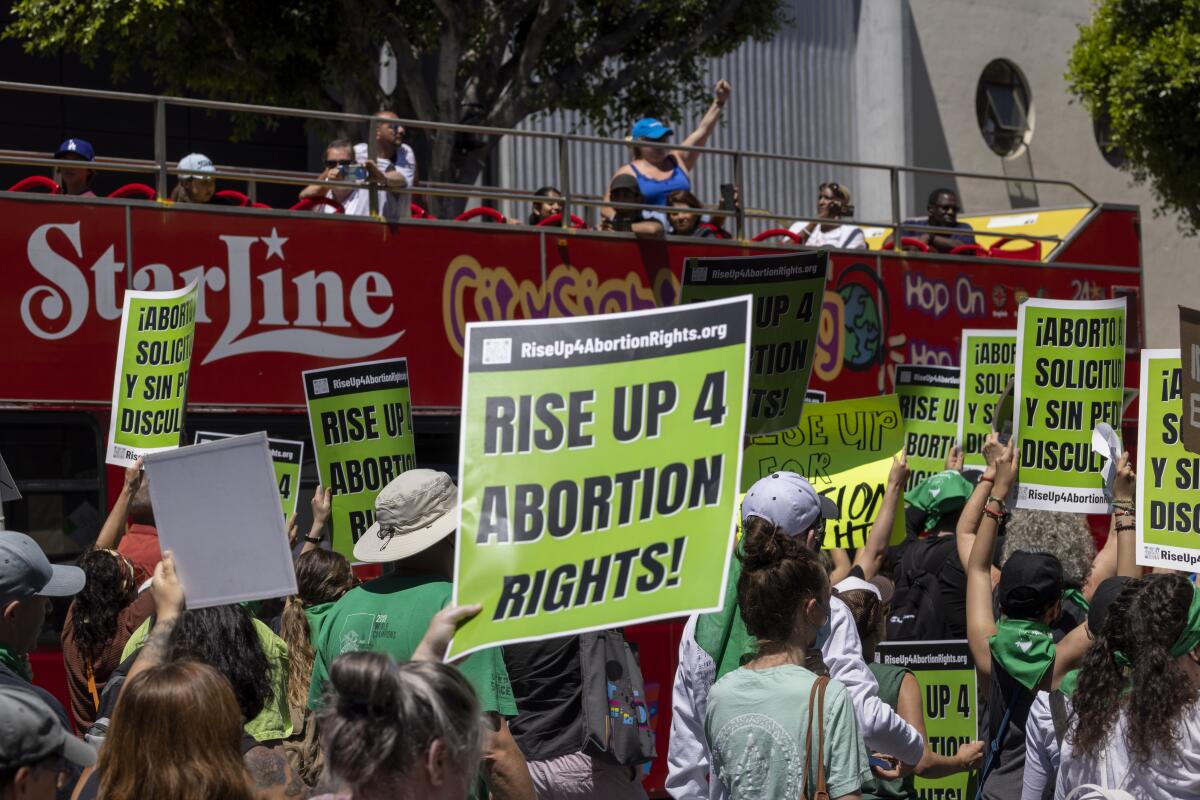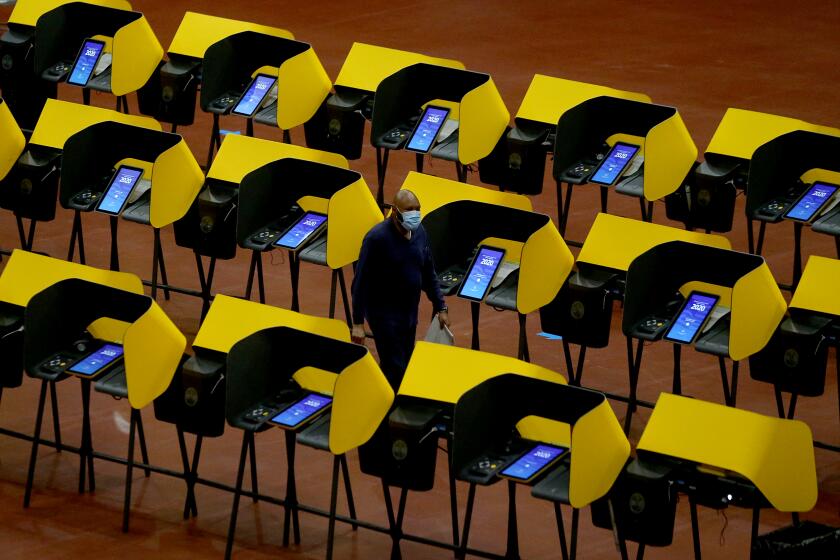Yes to abortion rights and arts education: How I’m voting on California ballot propositions

- Share via
SACRAMENTO — Here is a final unvarnished, admittedly biased summary of the seven propositions on the state ballot.
Three measures — about sports betting and taxing the rich — are prime examples of special interests capitalizing on California’s century-old system of direct democracy. Two others — concerning dialysis treatment and tobacco products — amount to blatant abuses of the treasured system.
This is how I view the ballot measures:
Proposition 1: It would cement current state abortion rights into the California Constitution.
Democratic sponsors contend that’s needed to protect these rights from a future conservative governor or Legislature, although such a scenario is practically impossible to envision in this blue state.
They point out, however, that a decade ago hardly anyone envisioned the U.S. Supreme Court killing Roe vs. Wade. But it did in June, ruling that each state could set its own abortion laws. Who knows what restrictions a future court might impose — or, more conceivably, a Republican Congress and president?
But let’s be honest: Politics was the main motivator of most Democratic lawmakers. They placed it on the ballot hoping Proposition 1 will boost Democratic turnout, especially among young women.
The opposition, including the Catholic Church, argues that the broadly worded proposition would permit abortions right up until birth. I don’t buy it, based on conversations with some constitutional law professors.
“Constitutional rights are never absolute. They always allow some restriction,” Loyola Law School professor Brietta Clark told me.
An example: The 2nd Amendment of the U.S. Constitution declares that the right “to keep and bear arms shall not be infringed.” But there are lots of gun control laws, especially in this state.
Current California law states that once a fetus is considered viable — around 23 weeks — an abortion can be obtained only if continued pregnancy poses a significant risk to a woman’s health or life. That would remain in effect, the “yes” side says.
California should pass Proposition 1 and shout a loud voice across the country supporting abortion rights.
Propositions 26 and 27: Sports betting.
Wagering on professional sports would be allowed at tribal casinos and four major racetracks under Proposition 26. There’d be online sports betting — on laptops or smartphones — under Proposition 27.
Polls show both initiatives failing miserably, and for good reason.
“It turns out, there’s not a big group of people who are very interested in sports betting,” says Mark Baldassare, a pollster who heads the Public Policy Institute of California.
But there are plenty who are concerned about feeding adult gambling addiction or children setting up phony online accounts and getting hooked.
An unprecedented nearly half-billion dollars in smothering TV ads have confused people and resulted in their saying a pox on both measures.
Tribes operating casinos are very worried about out-of-state online operations cutting into their profits. So, they’ve ignored their own Proposition 26 and focused entirely on trashing Proposition 27. No one is selling 26 and it seems everyone — except the online gambling outfits — are dumping on 27.
They deserve each other. No on both.
California’s November election will feature seven statewide ballot measures.
Proposition 28: Music and arts funding.
The initiative would double state money — from roughly $1 billion to $2 billion — for K-12 public school programs such as orchestra, choir, dance, art and theater.
They’re usually the first classes cut when hard times hit. The added money would be permanent and not require a tax increase.
Music and arts spark creativity in students and make them more well-rounded adults.
This is the easiest “yes” vote on the ballot.
Proposition 29: Dialysis treatment.
The measure would stiffen requirements for kidney dialysis treatment in clinics. But this really is about a union using the initiative process as a tool for political extortion after failed attempts to organize dialysis healthcare workers.
It’s the third straight general election in which the Service Employees International Union-United Healthcare Workers West has sponsored a similar ballot measure. The first two were soundly rejected, and 29 is also trailing in polls. But the union doesn’t seem to care. It isn’t running any TV ads or spending much money trying to sell voters.
The tacit message to dialysis treatment companies: Bow to our unionizing or we’ll keep forcing you to spend around $100 million each election year to fight our initiatives.
Dialysis clinics say the increased treatment isn’t necessary. There are about 650 of them in California. And the nonpartisan legislative analyst estimates Proposition 29 would increase each clinic’s costs “by several hundred thousand dollars annually on average,” perhaps forcing some to close.
Californians should say “no” to using the ballot for crass extortion.
Proposition 30: Tax the rich to subsidize electric car purchases.
This initiative would raise the state’s top personal income tax rate to a ludicrous 15.05%. It’s already at 13.3%, by far the nation’s highest and roughly double the national average. Seven states — including Texas and Florida — have no state income tax.
So, we’d enhance our reputation as the state with the highest taxes and thorniest regulations, and as the most expensive place to do business and invest.
The new top rate would be levied on annual incomes exceeding $2 million. That’s not a large group, just 0.2% of tax filers. But they’re the easiest to hit up by voters — and in this case also by a special interest: ride-hailing Lyft, the initiative’s big bankroller.
Of the up to $5 billion in new tax revenue, 80% would help motorists convert to electric vehicles. That includes drivers for Lyft, which the state has ordered to convert to zero-emission vehicles by 2030.
But the state already has allocated $16.5 billion for a multi-year program of electric car conversion.
Gov. Gavin Newsom calls it a “terrible, terrible initiative.” The California Teachers Assn. is opposed because schools would be denied any of the increased revenue.
This tax hike isn’t needed and is a bad look for California.
Proposition 31: E-cigarettes.
This initiative would ban the retail sale of flavored tobacco products that are addicting teens to nicotine. They’d be banned for all age groups so a big brother couldn’t buy sweet-scented, cancer-nurturing poison for a kid.
Proposition 31 is a referendum sponsored by tobacco giants to repeal a law enacted by the Legislature in 2020. They spent $20 million to collect enough voter signatures to qualify the measure for the ballot. That gave them two more years to profit from an additional $1 billion in flavored nicotine sales.
A “yes” vote is needed to finally implement the ban.
Big Tobacco already has won at the store. Now it should lose big on the ballot.
More to Read
Sign up for Essential California
The most important California stories and recommendations in your inbox every morning.
You may occasionally receive promotional content from the Los Angeles Times.












